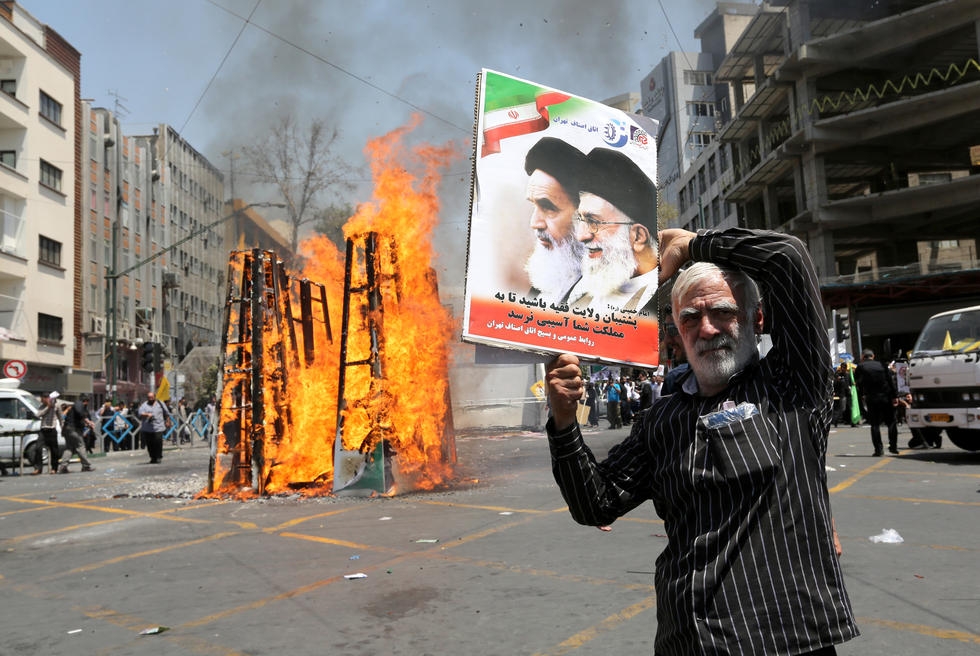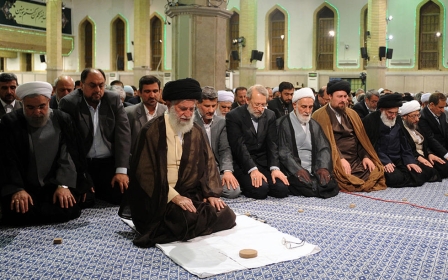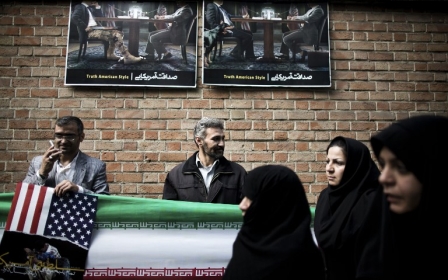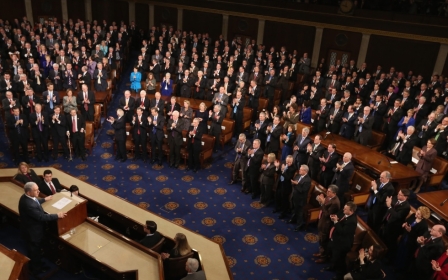Jerusalem Day defines Iran’s enduring animosity toward Israel

For the past 36 years the annual Quds (Jerusalem) Day processions in Iran have marked an important date in the revolutionary calendar. Falling on the last Friday of the fasting month of Ramadan, Quds Day was designated by the late revolutionary leader Ayatollah Ruhollah Khomeini as a rallying point for the Islamic Republic’s foreign policy.
Ostensibly dedicated to the liberation of Jerusalem – and by extension the destruction of the State of Israel – in practical terms the Quds Day rallies are designed to display public support for the Islamic Republic’s foreign policy.
Rallies take place all over Iran and beyond, in the world’s most important capitals, to underline the putative global popularity of Iranian foreign policy.
Beyond the display of animosity toward Israel, Quds Day has served two other important political-ideological functions: opposition to the West for its support of Israel and a display of Muslim unity in the face of occupation and humiliation.
On the eve of a historic nuclear accord with the international community – which carries considerable potential for a broader détente with the United States – opposition to the West will become a hard sell to constituencies beyond the Islamic Republic’s natural base.
Moreover, the veneer of Muslim unity is subject to daily ferocious assault across the region as evidenced by the rise of the Islamic State (IS) and the inevitable reaction by Iran and allied groups.
Iran & Israel: Perennial foes?
In its annual Quds Day communique, the Islamic Revolutionary Guards Corps (IRGC) describes the removal of the “cancerous tumour” of Israel as the top priority of the Islamic world. Striking a triumphalist note, and in an implicit reference to the Iranian organised “resistance camp,” the IRGC communique boasts that the Zionist dream of “Greater Israel” from the Nile to the Euphrates has inadvertently strengthened a movement that seeks to restore Palestine from the “river to the sea”.
Back in 2005 when former president Mahmoud Ahmadinejad caused a furore by apparently calling for the destruction of Israel, Iranian diplomats and their friends were at pains to moderate this stance and rationalise the Islamic Republic’s stance on the Palestinian question.
The official diplomatic line is that Iran is committed to the abolition of Israel via peaceful means, preferably a referendum - comprising the Palestinian diaspora - which settles the political identity and destiny not only of the occupied territories but of historic Palestine as a whole.
But this diplomatic narrative sits uncomfortably with a mountain of statements by the IRGC and other revolutionary bodies which project implacable animosity toward Israel and seek to encourage adversarial - if not armed - resistance against the Israeli occupation.
Analysts have long laboured on the question as to whether Iran’s tough position on Israel is influenced more by geopolitics or ideology. The balance of opinion weighs favourably on the side of geopolitical proponents who seek to paint the Iranian-Israeli conflict as foremost a strategic rivalry for control and influence in the Middle East.
This narrative is also favoured by Iran’s Arab rivals in the Persian Gulf and beyond who seek to discredit Iran’s status as a formidable ideological power with deep influence amongst certain constituencies in the Arab world.
The primary problem with the geopolitical theory is that it ignores cold strategic realities as well as recent historical memory. For a start, Iran and Israel were embryonic allies before the Islamic Revolution, precisely because Iranian leaders at the time had correctly identified Israel as a balance to Iran’s unfriendly Arab neighbours.
More broadly, the experience of the past three decades has shown that regardless of the depth of Iran’s commitment to the Palestinian cause, the majority of Arab rulers, as well as a majority of public opinion in Sunni Arab quarters, will not be assuaged. In fact, the opposite has occurred, as evidenced by unprecedentedly intense anti-Iranian feelings across much of the Sunni Arab world.
Furthermore, the proponents of the geopolitical theory ignore the profound anti-Zionist beliefs and attitudes of Iranian leaders and their most faithful followers. By virtue of these beliefs, and the resulting Iranian-organised regional anti-Israeli coalition, the Islamic Republic can credibly claim to be Israel’s most effective and determined enemy.
Post-nuclear era
It now seems likely that Iran and the international community will at some point - if not by the declared deadlines - strike a deal to contain the development of Iran’s nuclear industry in exchange for sanctions relief and other benefits.
This potential nuclear accord is a central feature of Iranian President Hassan Rouhani’s drive to fully rationalise Iranian foreign policy with a view to reaching a broad-based understanding with the United States.
However, even the most qualified form of normalisation of ties with the US requires a softening of the Iranian position on Israel. In view of the improbability of this scenario for the reasons cited above, Rouhani’s foreign policy will have to contend with a profound contradiction; one which he will likely not be able to resolve.
In fact, a nuclear accord may intensify the Iranian-Israeli conflict beyond a war by proxy, especially if Israel exploits inevitable difficulties and misunderstandings on the accord’s implementation by striking at Iranian nuclear facilities.
The rise of sectarianism also increases the potential for conflict, particularly in Lebanon where another shooting war between Israel and Iran’s ally Hezbollah is only a matter of time.
In their annual communique, the IRGC links the rise of the self-proclaimed Islamic State with Israel’s drive to increase its security capacity by sowing discord and strife across the region. Similarly, the Saudi-led military campaign in Yemen is interpreted by the IRGC as foremost a plan to destroy emerging anti-Zionist structures, a clear reference to the pro-Iranian Houthi movement.
It appears that amidst all the chaos in the region and with a possible major shift in Iran’s difficult relations with the West on the horizon, the Islamic Republic is determined to maintain its tough position on Israel.
Quds Day rallies may become livelier and more relevant in the years ahead.
- Mahan Abedin is an analyst of Iranian politics. He is the director of the research group Dysart Consulting.
The views expressed in this article belong to the author and do not necessarily reflect the editorial policy of Middle East Eye.
Photo: An Iranian protester holds a placard bearing portraits of Iran's Supreme Leader Ayatollah Ali Khamenei (R) and Iraq's top Shia cleric Grand Ayatollah Ali al-Sistani as he stands in front of burning prints of Israeli, American and Saudi Arabian flags to mark the Quds (Jerusalem) International day in Tehran on July 10, 2015. AFP)
New MEE newsletter: Jerusalem Dispatch
Sign up to get the latest insights and analysis on Israel-Palestine, alongside Turkey Unpacked and other MEE newsletters
Middle East Eye delivers independent and unrivalled coverage and analysis of the Middle East, North Africa and beyond. To learn more about republishing this content and the associated fees, please fill out this form. More about MEE can be found here.





